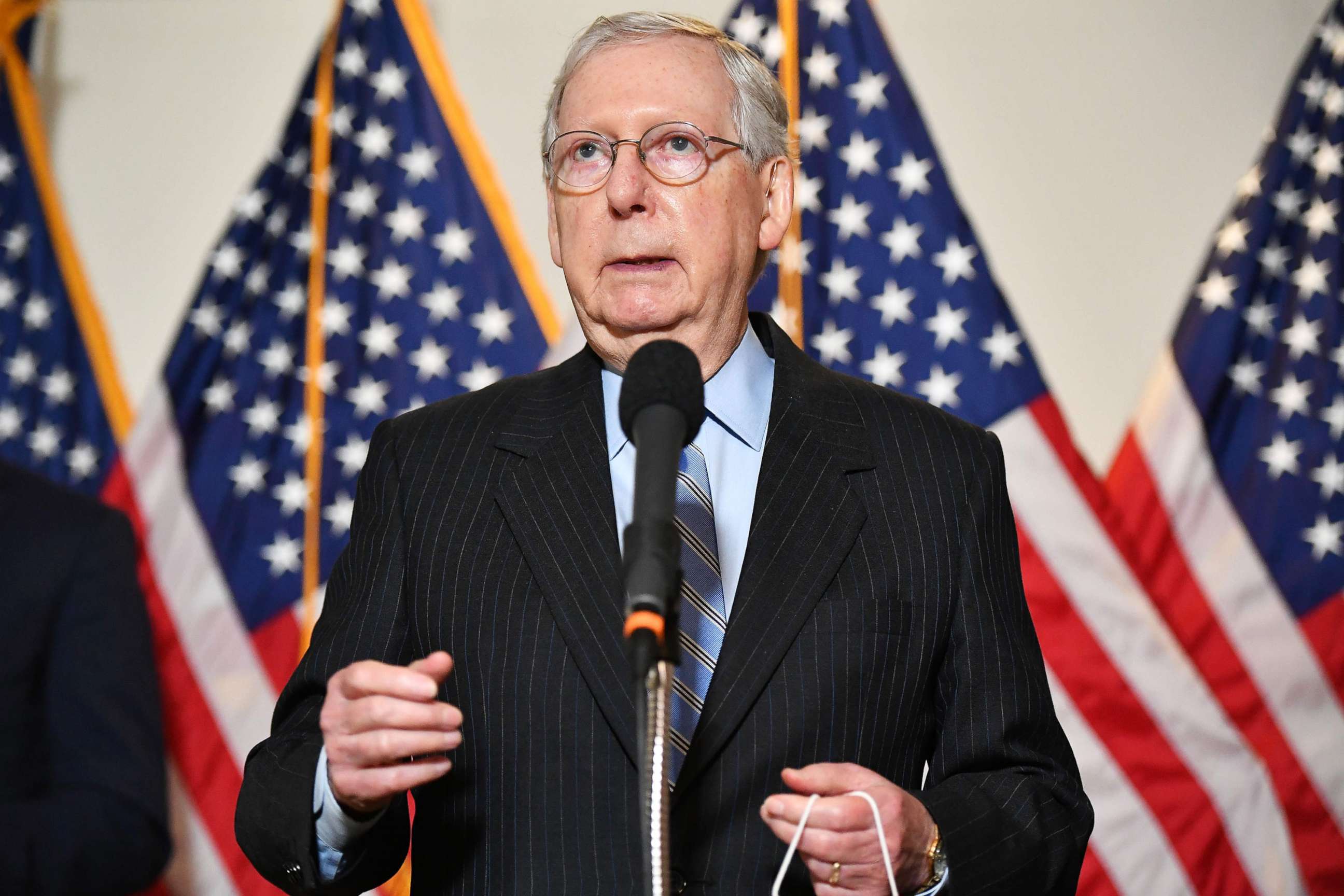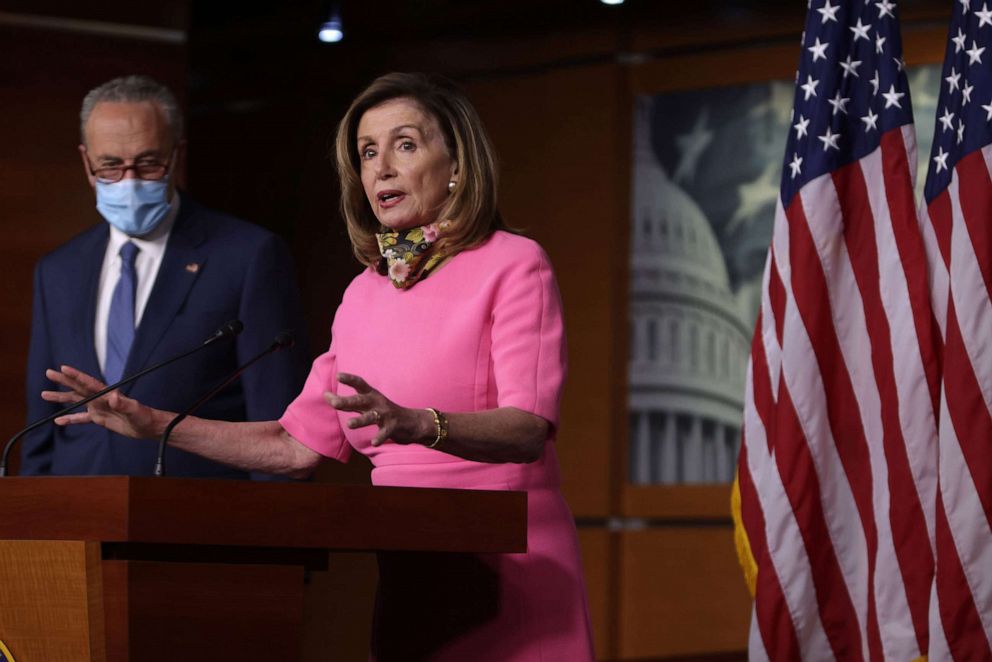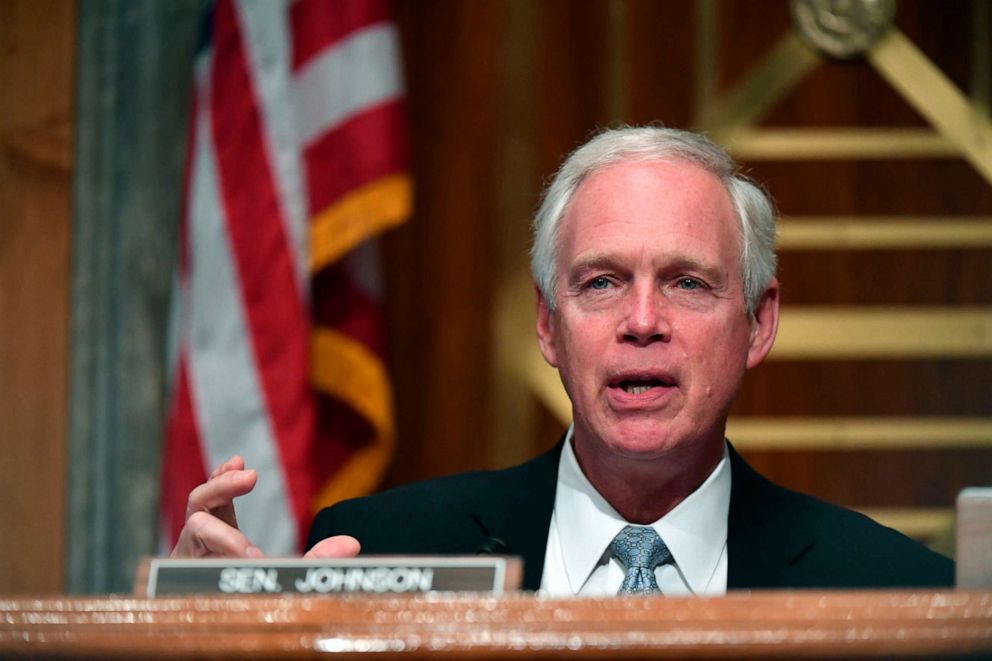Senate returns to partisan showdowns as election looms
Coronavirus relief and Biden probes are expected to be key points of focus.
Senators return to Washington Tuesday with a slate of politically contentious objectives to check off just as the 2020 election season revs into high gear.
While the stalemate continues on another COVID-19 relief package, other legislative priorities -- primarily a stopgap government funding bill to avert a government shutdown -- also loom large.
Lawmakers, bitterly divided over coronavirus spending, face a tremendous time crunch with just two weeks to break the logjam before they depart for the month of October to focus on the November election.
Majority Leader Mitch McConnell, in press stops around Kentucky during the Senate recess, laid the groundwork for a politically difficult return, pointing to the upcoming election as the cause of Congress' failure to find common ground on coronavirus relief before its exodus from Washington at the beginning of August.
"Regretfully as we've gotten closer and closer to the election, the degree of bipartisan cooperation has descended," McConnell said at a local stop Wednesday. "And I can't tell you for sure whether we'll get another rescue package or not."

After weeks of failed negotiations between the administration and House Speaker Nancy Pelosi and Senate Minority Leader Chuck Schumer, Senate Republicans are now looking to advance a new piece of COVID-19 relief legislation that’s a slimmed-down version of their original $1 trillion Health, Economic Assistance, Liability Protection and Schools (HEALS) Act.
While the HEALS Act floundered -- failing to garner support from more than half of the GOP conference -- Republican leadership hopes the new, "skinny" proposal will attract at least 51 Republican votes, a statement of support from the majority that might aid McConnell in bipartisan negotiations.
The new $500 billion proposal, which is not expected to attract Democratic support, includes funding for reduced federal unemployment insurance benefits, virus treatment and tracing, vaccines, liability protections and aid for schools and small businesses.
"We have a focused, targeted solution that we hope that the House would pass," Sen. John Barrasso, a member of GOP leadership, told reporters Tuesday, adding, "That's the goal, is to come back and vote to move to that."
While a vote on the measure -- which sources tell ABC News is expected Thursday -- would give vulnerable Republicans something to point to in their reelections as Americans around the country suffer amid the coronavirus pandemic, it is not expected to get the 60 votes needed for passage.
In a letter to his colleagues on Thursday, Schumer, D-N.Y., called the $500 billion proposal "emaciated" and "clearly inadequate."
"It is clear Republicans are trying to "check the box" and give the appearance of action rather than actually meet the truly profound needs of the American people," Schumer wrote.
Amid the bitter partisanship around virus funding, lawmakers must come together to fund the government by Sept. 30 to avert a government shutdown.
And while many thought congressional leaders would be forced to merge COVID-19 stimulus aid efforts with a stopgap government funding bill, a precarious proposition given the state of virus negotiations, Pelosi and Treasury Secretary Mnuchin reached a crucial agreement this week that seems to move the two top agenda items on separate tracks.

On Tuesday, Pelosi and Mnuchin agreed on a temporary government funding bill, according to a person familiar with their Tuesday phone call. The informal agreement called a continuing resolution would stave off a government shutdown after Sep. 30 and avoid entangling the issue with ongoing coronavirus relief negotiations.
The proposal to fund government at current levels, which sources tell ABC News is expected to be approved in the GOP-run Senate, could avoid a shutdown before the November election and potentially through the end of the year, depending on the agreement reached by Democrats and the Trump administration.
"House Democrats are for a clean continuing resolution," Pelosi spokesman Drew Hammill told ABC News.
But the high-level agreement on a continuing resolution would still leave pandemic funding unresolved while a host of other issues are poised to come to a head over the next month.
With a heightened focus on the upcoming election, Democrats are expected to return to the Hill pushing back on an Aug. 29 decision by the Office of the Director of National Intelligence to cease in-person election security briefings to Congress and instead providing intelligence information only in written form.
The newly-minted Director of National Intelligence John Ratcliffe told a group of senators last week that "this approach helps ensure, to the maximum extent possible, that the information ODNI [Office of the Director of National Intelligence] provides the Congress … is not misunderstood nor politicized."
Democrats lambasted the decision, with Pelosi calling it "an abdication of your responsibility to keep the American people and their elected representatives informed of foreign threats to the 2020 election" in a letter to Ratcliffe.
News broke the following day of a DHS intelligence bulletin from mid-July, which warned of Russia’s attempt to discredit Democratic presidential nominee Joe Biden. As ABC News reported, the memo was never published, fueling concern from Democrats that the administration is seeking to withhold crucial security information in advance of the election. Many Republicans have yet to weigh in on the matter.
Meanwhile, three Senate committee chairmen are expected to unveil the findings of two parallel investigations digging into the 2016 federal probes of Russian interference during the 2016 election -- something Democrats have decried as having partisan motivations, specifically to hurt Biden’s candidacy and to aid Trump.

Sens. Lindsey Graham, Ron Johnson and Chuck Grassley have been leading the probes with an eye toward Biden and the involvement of his son, Hunter Biden, in Burisma, a Ukrainian energy company.
There is no evidence that either of the Bidens committed a crime, and they are not believed to be under any type of federal investigation related to Hunter Biden's work in Ukraine.
Still, the GOP chairmen have said they expect to publish their reports in advance of the 2020 election. Johnson said his report on the Bidens and Burisma could come as soon as mid-September.
A statement released by the intelligence community in August warned of Russian interference in the election by way of pro-Russian Ukrainian national Andriy Derkach, who the statement said is "spreading claims about corruption -- including through publicizing leaked phone calls -- to undermine former Vice President Biden's candidacy and the Democratic Party."
Democrats have alleged that Johnson and Grassley have used documents furnished by Derkach as part of their investigation, a claim that both senators have denied.
On Thursday, Johnson and Grassley issued a statement in defense of their probe.
"Congress should take seriously any real threat to our elections, not just the ones Democrats find politically convenient or ones they cook up based on actual disinformation to smear their political rivals," the senators wrote.
ABC News' Benjamin Siegel contributed to this report.



